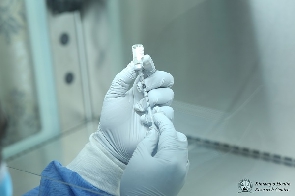The Kintampo Health Research Centre (KHRC) since its establishment in 1994 has been in active clinical research and has been instrumental in conducting key trials that have led to change in policies both locally and internationally.
The center is best known for its successful conduct of the pivotal phase 3 trial of the first malaria vaccine (RTS, S), which is being piloted and implemented in some regions in Ghana. The center has conducted several trials in other therapeutic areas including meningitis, and sickle cell disease, among others.
In a first of its kind at the Kintampo Health Research Centre, the center began recruitment into a phase 1 Lassa fever trial in September 2022. A phase 1 trial is the first human trial conducted to determine primarily the safety of an investigational product after the product has successfully passed the preclinical phase where several tests are conducted in the laboratory on animal models.
KHRC with sponsorship from Emergent Product Development Gaithersburg, Inc., is currently conducting a phase 1 Lassa fever vaccine trial in healthy adults in the Kintampo North Municipality and Kintampo South District.
Lassa fever is an acute viral hemorrhagic illness. The disease is endemic in parts of West Africa including Sierra Leone, Guinea, and Nigeria. There is currently no specific treatment or approved vaccine for Lassa fever.
As part of a measure to protect the safety and well-being of participants, study staff received emergency medicine training in basic and advanced cardiac life support to build their capacity in the management of medical emergencies prior to the start of the study.
The center has a 12-bed clinical trial unit equipped with consulting/examination rooms, a pharmacy unit, a specimen collection room, a nurse’s area, twelve patient rooms, an office, and a kitchen.
This setup has emergency equipment including a crash cart with emergency medicines, oxygen cylinders, and logistics to provide intranasal oxygen to participants, an electric suction machine, ECG machine, defibrillator, and airway management devices including Ambu bag and masks, Guedel and laryngeal mask airways and endotracheal tubes.
The unit is linked to the emergency unit of the Kintampo Municipal Hospital by a short walkway. The center is working closely with the Hospital for quick referrals of participants for emergency care whenever necessary.
The trial documents are reviewed and approved by institutional and central ethics committees and the Ghana Food and Drugs Authority (FDA) prior to implementation. Close monitoring and scrutiny of the trial are routinely conducted by the sponsor’s representatives, the ethics committees, and the Ghana FDA while the trial is ongoing to ensure the safety of trial participants and the accuracy of trial results.
The current outbreak of Lassa fever in Ghana is a wake-up call to all stakeholders to speed up the development of vaccines and medicines to fight this disease. It is hoped that the development of Emergent’s candidate vaccine will become the first licensed vaccine for the prevention of Lassa fever.
Health News of Friday, 7 April 2023
Source: Christopher Sam, Contributor

















